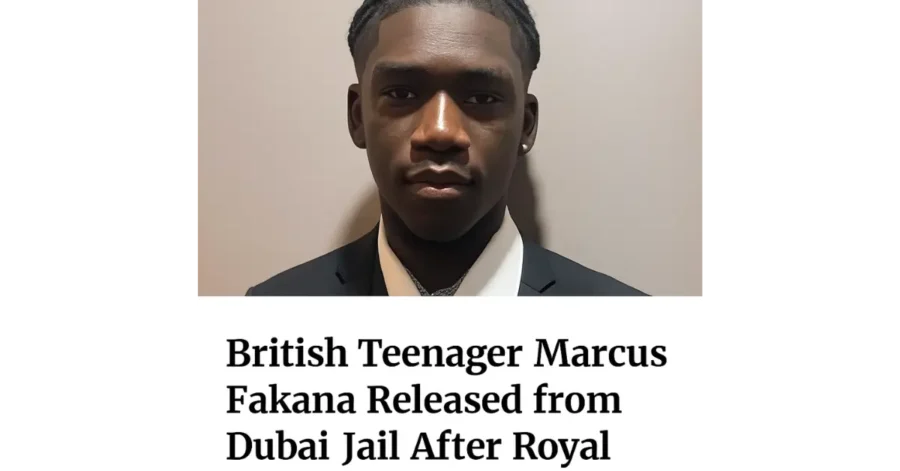
British Teenager Marcus Fakana Released from Dubai Jail After Royal Pardon
The story of Marcus Fakana is one that has gripped many hearts across the UK and beyond—a tale of a young man caught in the complex web of cultural and legal differences, and ultimately freed through an act of royal pardon. Marcus, a UK teenager from Tottenham, London, spent months behind bars in Dubai jail after being convicted for a consensual relationship with a 17-year-old British girl during a family holiday. His release in July 2025 has sparked relief, reflection, and renewed conversations about the clash between international laws and personal freedoms.
A Holiday Romance Turns Into a Legal Ordeal
It all began as a typical family trip to the United Arab Emirates. Marcus, then 18, was enjoying time with his parents in Dubai when a holiday romance blossomed with another British tourist, who was just months younger than him. What seemed like a youthful connection soon spiraled into a nightmare when the girl’s mother discovered messages exchanged between the pair upon returning to the UK. She reported the relationship to Dubai authorities, unknowingly setting in motion a chain of events that would lead to Marcus’s arrest.
The crux of the issue lies in the age-of-consent UAE, which is set at 18—different from the UK’s laws. Despite the relationship being consensual and between peers close in age, Dubai’s strict laws led to Marcus being detained in Dubai and later sentenced to a year in Al-Awir prison.
The Weight of International Law Clash
Marcus’s case highlights the often harsh realities faced by travelers navigating different legal systems. The international law clash between the UK and UAE’s age of consent laws meant that what was legal and normal at home became criminal abroad. For Marcus and his family, this was a devastating and bewildering experience.
The ordeal drew widespread media attention and public sympathy, with many questioning the fairness of the laws and the treatment of foreign nationals in the UAE’s justice system. It also sparked a broader dialogue about the risks young people face when traveling internationally without full awareness of local laws.
The Role of Advocacy and the Path to Freedom
Throughout Marcus’s imprisonment, advocacy groups like Detained in Dubai worked tirelessly to support him and his family. Their efforts, combined with diplomatic channels and public pressure, culminated in a royal pardon granted by Sheikh Mohammed bin Rashid Al Maktoum, the ruler of Dubai. This act of royal forgiveness came as part of the Eid celebrations, a traditional time when clemency is extended to prisoners.
The pardon allowed Marcus to return safely to the UK on July 3, 2025, where he is now recovering and surrounded by loved ones. Radha Stirling, CEO of Detained in Dubai, described Marcus as “an extraordinary young man caught in a deeply unjust system,” emphasizing the emotional and psychological toll such an experience takes on someone so young.
Reflections on Youth, Law, and Cultural Differences
Marcus’s story is more than a legal case; it’s a human one. It reminds us how vulnerable young people can be when caught between cultures and legal frameworks that don’t always align. The Bunny Wailer family appeal and other public campaigns have shown how communities rally around individuals facing injustice abroad.
For Marcus, the months in Dubai jail were a harsh lesson in the realities of international travel and the importance of understanding local customs and laws. Yet, his resilience and the support he received highlight the power of compassion and advocacy in the face of adversity.
What This Means for Other Young Travelers
The case has prompted calls for better education around interracial dating UK and relationships abroad, especially for young people who may not fully grasp the legal nuances of the countries they visit. It also raises questions about how governments can better protect their citizens and ensure fair treatment overseas.
Families and young travelers are urged to be aware of the age-of-consent UAE and similar laws elsewhere, recognizing that what’s legal in one country might not be in another. Marcus’s experience serves as a cautionary tale but also a hopeful reminder that justice can prevail.
Moving Forward: Healing and Awareness
Now back home, Marcus faces the long road of healing—physically, emotionally, and socially. The sudden shift from incarceration to freedom is overwhelming, and support systems are crucial in helping him rebuild his life.
His story has also increased public awareness missing loved ones and those detained abroad, shining a light on the challenges faced by many in similar situations. It underscores the need for continued dialogue about cultural understanding, legal education, and the protection of human rights.
Final Thoughts: A Story of Resilience and Hope
Marcus Fakana’s journey from Detained in Dubai to freedom is a powerful narrative of resilience, cultural complexity, and the human spirit’s capacity to endure. It reminds us that behind every headline is a young person navigating a bewildering world, and behind every legal system are stories that demand empathy and understanding.
As Marcus begins to rebuild his life, his experience stands as a beacon for others—highlighting the importance of awareness, advocacy, and the hope that even in the darkest moments, there can be light.

